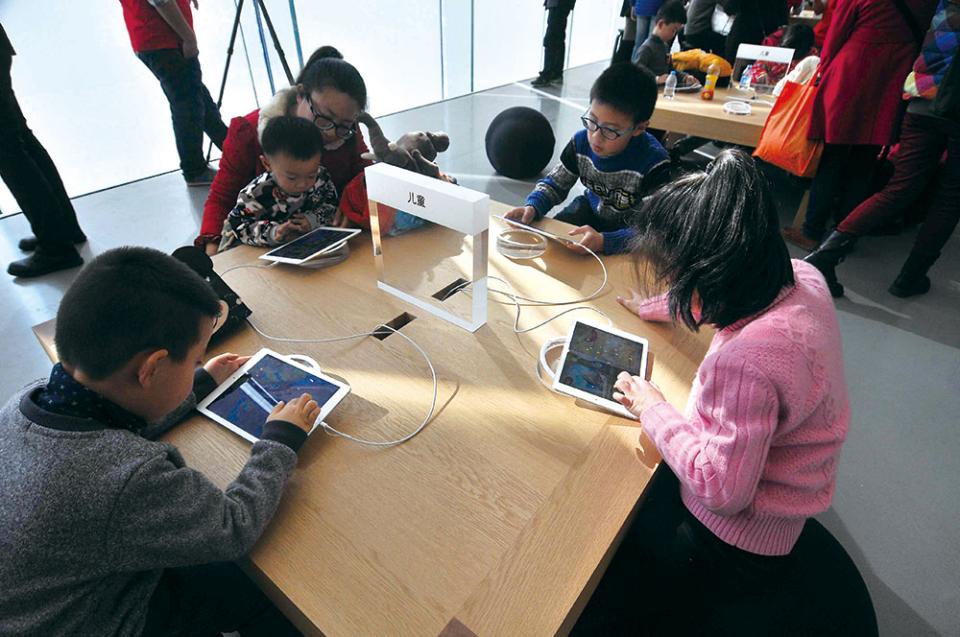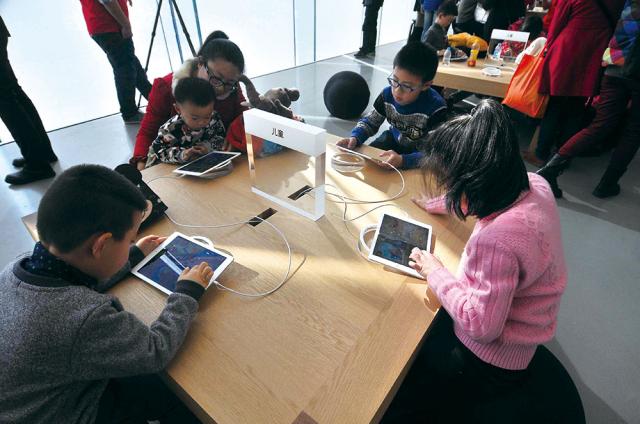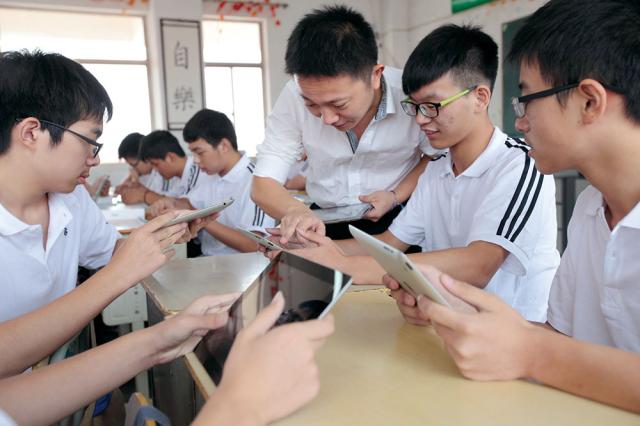Shi Wei’s job is to get kids playing iPad games. But he doesn’t bring his work home.
“Once I became a dad, the first thing I thought of was how to keep my child away from the iPad,” Shi, who works for Apple as an app developer and product manager for kids’ games, told NewsChina.
After hearing that his friend’s three-year-old had developed a terrible visual defect as a consequence of spending too much time on tablets, Shi decided to ban his child from using the iPad at all until he turns eight.
Childhood has undergone an alarming transformation after kids, teens and even toddlers have been swamped by the new digital media environment. With millions of games available for each gadget, and the number of touchscreen devices multiplying dramatically in households, parents are getting more and more anxious about the touchscreen age.
What will touchscreen devices bring to the next generation? Will children drown in the oceans of apps? Chinese parents are struggling to find a proper solution to cope with their children’s changed childhoods during a period of historic transition.
Mental Catastrophe?
Wang Meng, a renowned writer, academic and former minister of culture, born in 1934, has described the advent of the touchscreen age as “a mental catastrophe.” He argues that touchscreen devices enslave minds by drowning them in audiovisual information with “questionable cultural content.” As he writes in his article “The Mental Catastrophe of the Touchscreen Age,” smartphones and tablets penetrate our lives and minds, and their services “guide us, and perhaps hijack us.”
Wang highlighted the concept of “information alienation.” He says that communication itself has transformed from a medium into a manifestation of values; how quickly and widely something spreads has replaced its cultural content as the main evaluation of its success.
“When people are only receiving information through their ears, eyes, tongues, noses and skin instead of their brains, it means brains are shrinking and souls shriveling. Humanity is inevitably approaching an age of idiots,” Wang wrote.
Wang’s low opinion of touchscreen culture has been echoed by Cao Jin, a professor at Fudan Journalism School. In 2012, two years after Apple launched the iPad, Cao, in a project titled “New Media and Urban Children,” coined the term “play as child labor” to describe the condition of underage iPad users.
Cao wrote: “Nowadays, child laborers are no longer shabbily clothed and working in dark corners. Instead, they nestle in cozy rooms, being asked by digital devices, ‘Do you like Plants vs. Zombies? Do you like Fruit Ninja?’”
Cao argued that through touchscreens, capital has produced “a new set of enclosures in cyber-society” and that this exploitation has reached the most innocent consumers, children. According to his argument, children playing games on touchscreen devices have become laborers who work for free for capital. He claimed technology and the market have encroached on childhood and turned it into an accessible and controllable market resource for transnational capital.
Statistics from the China Internet Network Information Center indicate that, by the end of 2015, the number of children under 10 years old surfing the Internet had reached 18 million, and the number of users under 18 was over 100 million. A report provided by qq.com, one of China’s biggest portals, showed that 56 percent of Chinese youngsters have their first contact with the Internet before they turn five, even though most Chinese parents expect their children not to use the Internet until they are at least seven.
According to a survey of 15,000 children conducted by the Institute of Child and Adolescent Health of Peking University, 32.5 percent of those interviewed spent between one and three hours using digital gadgets every day. Meanwhile, 60.9 percent of parents interviewed said that their children spent less than an hour a day on outdoor activities. Another disturbing result from the survey was that nearsightedness is growing more rapidly among elementary school students than any other group. More than 40 percent of pupils are affected by myopia, a rate double that of the year 2000.
The media love scare stories about the negative effects of new technology on children. Everything from myopia to speech impairments and autism is blamed on the rise of tablets, which wears parents’ nerves thin.
Dai Wenjing, a researcher at the Preschool Education Department at Shanghai Normal University, surveyed preschoolers’ use of iPads in 2013. In one case study, a five-year-old boy was incapable of speech. Since the boy’s parents were too busy at work to raise him properly and his grandparents spent their time playing mahjong, for long periods of the day the boy had no companion but his iPad. The main cause of his delayed speech, the doctor said, was “spending too much time communicating with machines, which resulted in his insensitivity to human voices.”
Nevertheless, Dai told NewsChina that scientists have not yet come to a conclusion on whether or not using digital devices is inevitably harmful for kids. She said that technology may exert quite distinct influences on different children. In another case that Dai described to NewsChina, another child was left in the care of his grandparents by his busy parents. His grandparents spoke only in their local dialect, not standard Mandarin, but through the assistance of the iPad, he learned children’s songs and loved to tell stories in Mandarin.
Fearful Parents
“If Daddy can play, why can’t I?” Wang Guan, 36, feels tongue-tied when his daughter asks him this question. As the TV anchor of a finance and economics program, Wang can’t avoid using his smartphone at home. But as soon as he uses it, his daughter creeps up from behind him to ask for her own digital time. Wang has set strict family rules about use of the iPad: twice a day, morning and night, 30 minutes each time.
In an age when many perceive parental authority as declining, establishing strict domestic touchscreen rules can’t solve every problem. Children are inclined to imitate their parents when they see them using digital devices to play games or watch videos. Most children harbor a grudge against such strict time restrictions. In an experiment conducted by Cao Jin on 100 preschoolers in Shanghai, 79 percent of kids reacted strongly when parents took devices away from them.
“People feel that technology opens Pandora’s box. Parents don’t know what’s in the box and what technology will bring to their kids. They harbor a strong fear of uncertainty,” Wang told NewsChina.
There’s no doubt that communication technologies are changing rapidly. “Every five years there will be a technology upgrade, and every three years a significant breakthrough,” said Zhang Jie, an academician from the Research Institute of Media Education at Communication University of China.
After seeing the great potential of digital technology in education, Zhang is currently conducting a “future learning project” in Zhongshan, Guangdong Province, carrying out “e-learning” in six public elementary schools and two middle schools. She hopes that the e-learning, where tablets and mobile devices are used in the classroom, can be fully normalized within five years.
In the beginning, Zhang’s project was questioned and opposed by many parents. She found that many of her students had never used computers or surfed the Internet. “It’s not a money issue, so it’s not because their families could not afford to buy touchscreen devices. It’s a problem of ideas – our parents and teachers put too much effort into keeping kids from the Internet.”
Some parents complained to her that “it always displeases me when I see my child playing on the iPad.” Some admitted “if I find my kid awake and doing anything instead of studying, I feel anxious and think that they are wasting valuable time.”
As Zhang told NewsChina, apart from concerns over the negative effects that touchscreen devices may have on children, Chinese parents’ fear and anxiety also stem from their strong sense of insecurity about social competition.
“Many Chinese parents hope their kids can spend most of their time studying. When they see their kids playing, they always feel anxious, fearing that their kids might lose to their peers at the very beginning of the race,” said Zhang.
The strong awareness of competition was deeply embedded into Chinese minds over several generations of poverty and material scarcity, Zhang argued, saying “living better than others became people’s whole purpose.” But, she said, “today the touchscreen generation does not have to lose their own sense of individuality to fight over resources like earlier generations did. Individuality can be further developed and also respected.”
E-conciliation “Little Swallow, wearing a flower coat, flies here every spring…”
Feng Meirong, who works in the IT industry, was surprised when she heard her four-year-old son singing “The Little Swallow,” a classic Chinese children’s song written in the 1950s, and saw him dancing in front of the iPad. It was 30 years ago that Feng heard the song for the first time. She was sitting in the kitchen, hearing her mother happily humming the song and cooking dinner. Three decades later, her son swiped a screen and learned the song from a little orange dragon.
Feng’s son had his first contact with a touchscreen device at age two. All his toys were eclipsed as soon as the toddler was able to handle an iPad by himself. The Companion Dragon, an educational app intended for preschoolers, was the boy’s favorite. It features a little orange cartoon dragon designed as kids’ personal study companion. The content of the app covers English language learning, kids’ songs, math, idioms, general knowledge, classic texts and so on. Thanks to the orange dragon’s company, he learned Tang Dynasty (618-907) poems, traditional idioms, as well as the Three Character Classic, a 13th-century children’s text written in triplets for easy memorization.
The dragon became the boy’s best friend. Every time the boy neglected him, the dragon would say, “Why didn’t you play with me today? I miss you. Let’s sing a song!”
The majority of Chinese parents, as educator Zhang Jie stresses, see touchscreen devices as distraction or entertainment for children and underestimate tablets’ importance. But if people put the time and effort into mastering tablets, they may realize that they can be efficient tools to help children discover the world.
As part of her e-learning project, Zhang put e-textbooks onto tablets, which offer far more wider-ranging content than traditional textbooks. With a swipe of their fingers, her students can get to know every corner of the world by whirling a virtual globe, and learn more details through the stored visual and audio resources.
Although at first many parents still harbored concerns about e-textbooks, Zhang’s work has gradually worn down their disapproval. Parents are learning how to reconcile themselves with e-learning and are looking for suggestions. They try to accept tablets’ role in their children’s education, and seldom question their use. What concerns them most now are more specific issues, such as: “At what age is it proper for a child to have their first tablet?” “How can I make household rules on the use of the tablet?” “How long should kids spend on the tablet?”
In the touchscreen age, interactive designers try their best to retain their most fickle clients, children, and are using every means to keep parents assured, but there are still many moms and dads who are trying as hard as they can to keep their kids away from digital technology.
When parents worry about whether touch-screen technology will make kids lonelier and shorten their childhood, tech enthusiasts say the age of augmented and virtual reality is coming, in which human-computer interactive technology will be further developed.
The location-based augmented reality game Pokémon Go has swept the globe – though not China, where it’s not yet available. In the game, players use a mobile device’s GPS capability to capture, battle and train virtual creatures at specific locations.
Childhood has been fundamentally changed as interactive technology infiltrates more and more sectors in life. And as Dai Chuanqing, a developer of apps for children asked, “If the tendency is unavoidable, shouldn’t we help our children to ride the trend and become familiar with digital media as soon as possible?”

 Old Version
Old Version

